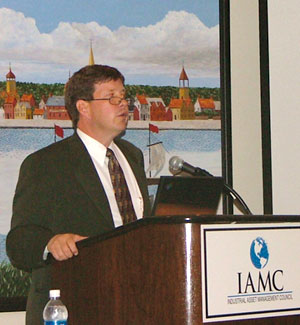
IAMC INSIDER
IAMC Professional Forum Special Report
Eminent Domain Update
| “Y |
ou need a condemnation plan just like you need a disaster recovery plan," Rick Little, director, real estate, for Weyerhaeuser Co., told a packed room at an
 |
"This is a disaster, especially when you are not going to be paid for it," said Jeffrey A. Beaver, attorney with Graham & Dunn PC and one of the chief counsels to Weyerhaeuser during negotiations with the fast- growing Port of Tacoma in Washington over the fate of a Weyerhaeuser wood- chip export facility.
"We use it to export huge volumes of chips to Asian customers, primarily in Japan, for their papermaking," explained Little, adding that it was a critical element of the company's domestic supply chain. A casino owned by the Puyallup Nation had already been relocated to accommodate the growing port. And the $25- million, 25- acre (10- hectare) Weyerhaeuser site, with its massive dock structure, deep- water access, nine rail lines and full- truck chip dumping stations, was in the port's sights, despite 33 years of leasing history.
"We entered into a 20- year lease with the port in 1972," said Little, "with five successive five- year extension options through 2017. In 2002, the port approached the business about the need to widen the Blair Waterway for safety reasons in order to accommodate post- Panamax ships. We didn't find out until two years later, when the business was verbally threatened by the port, that it needed to acquire additional land, and if they couldn't get it by negotiations, it would condemn. We were a hole in the doughnut. After six months of my negotiating with the port, they filed their action, even though we were prepared to consider some of the relocation options."
 |
 |
| Rick Little (left), director, real estate, for Weyerhaeuser Co., and Jeffrey A. Beaver (above), attorney with Graham & Dunn PC, know that eminent domain battles near ports aren't always a pretty picture. |
Wise Counsel
"You can put in provisions regarding rent abatement in the event of a partial take, damages in the event of a full take. You can include liquidation damages as part of the condemnation clause."
Complicating eminent domain discussions are three factors that essentially are fictions, said Beaver: 1) "fair market value," 2) "just compensation," and 3) "highest and best use." And he reminded his audience that not all projects that damage real estate are takings.
But the law of eminent domain has developed over time to this: Where the power is rationally related to a conceivable public purpose, the U.S. Supreme Court has never found a taking to violate the takings clause. And blight no longer needs to be proved.
"In the Weyerhaeuser matter, the port wanted to take the property for safety reasons, so it could facilitate post- Panamax vessels," Beaver explained. "But they didn't have to take the whole 25 acres – all they had to take was a fourth of it. That's not the only place we had wood chips. We figured, 'Okay, fine, just take that quarter.' But buried in the resolution that the port enacted was this phrase – 'for economic development.'"
The Kelo v. New London decision of 2005 stated that economic development was a traditional and long- accepted standard related to public purpose, though not public use, as long as the project was "rationally related to a conceivable public benefit." The loophole was left open for states to install more stringent restrictions. And did they ever.
"The reaction to Kelo was amazing, because nothing had really changed," said Beaver. "Many Americans had not known the extent to which condemnations were going on. A total of 19 states have enacted legislation in response to the decision. They are widely hailed, but a closer examination of them shows that nine of the laws have created little meaningful protection."
What remains meaningful, said both men, is the necessity of public- private partnership for economic development: "We know it's important to our communities to have this revitalization," said Beaver.
One audience member admitted to being blindsided by a taking in the middle of a modern manufacturing park in California, which the local town had decided to redevelop in its entirety into a mixed- use condo/retail development. "It takes you completely off guard," he said, "and it's not just the usual suspects."
The Weyerhaeuser chip facility, in the end, was able to extend the end of its lease from May 2004 to May 2006, and the company settled for $12 million while being relieved of any restoration obligations (estimated at $2.5 million). But the story is not over.
"We own 25 more acres there, a vital log export facility," reported Little. "Guess what? It's probably not too far away."
— Adam Bruns
